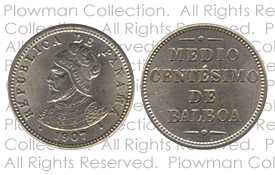Medio Centésimo Panama Coin Catalog (PC005)
Catálogo de Monedas de Medio Centésimo de Panamá

|
Below is a catalog or list of all known Medio Centésimo coins issued by Panama. However, this denomination was issued only in 1907, so the list is very short!
History of the DenominationOnce Panamá won independence from Colombia, it needed to create a new coinage system that would fit the needs of the people of Panamá and the be acceptable to the United States which was about to start construction on the Panama Canal (and intended to pay the majority of the canal workers in Panamanian money). The system Panama developed was a hybird between the Colombian pesos that people were used to and the United States dollar. Several background factors are important to remember:
To help facilitate the construction of the Panama Canal, the government of Panamá established parity or a ratio of one-to-one between Panamanian and American currency. Panamá went on the gold standard (although no gold coins were issued for the next 70 years) with one gold Balboa equivalent to one gold American dollar. American money was made legal tender in Panamá. Looking back on the inflation of bills issued by Colombia, Panamá selected to issue only coins and rely on American bills. With silver being so cheap and desiring to impress the world with a stable currency, Panamá choose to put twice as much silver in its coins as the United States had at that time. Thus Panamá's first coins were similar in size to the next highest denomination of American coins. The Panama five centésimos coin was about the size of an American dime, the Panama ten centésimos coin was about the size of an American quarter, the Panama twenty-five centésimos coin was about the size of an American half-dollar and the Panamá fifty centésimos coin was about the size of an American silver dollar. This double-size coinage made the replacement of the Columbian coins easier. The exchange rate of 2.30 pesos to one Balboa was not too far from 2 to 1. So the new crown-size fifty centésimos coin was worth just a little more than the Colombian peso. In fact, the fifty centésimos coin is called a peso to this very day. The new half-crown-size twenty-five centésimos was worth just a little more than the Colombian half peso, and so on down the line. Interestingly those who could not read the denominations on the Panamanian coins, such as illiterate Panamanians and Americans who could not read Spanish, thought there was a 2 to 1 exchange rate between Panamanian and American money. Some of the early Canal histories include this error. Initially Panama's smallest denomination was the 2˝ centésimos coin. However, the need for something smaller became evident, and in 1907 the medio centésimo was issued. Keeping in mind the double-size coinage scheme they had in place, Panamá selected to issue a half cent coin. It was slightly smaller than an American cent but made of nickel instead of copper. Around 1917 there was a steep rise in the value of silver due to World War I. It had no effect on American money, but the precious metal content of the double-size Panamanian money quickly surpassed the face value of the coins. Lots of Panamanian coins were shipped out of the country to be melted down for their silver content. The Panamanian government acted by doing away with the double-size coinage and selecting parity of size with American coins. The smallest denomination issued the next time around was a one centésimo similar in size and metal content to an American cent. The medio centésimo was never again issued.
PricingPricing is based on several factors, which ultimately are supply and demand. How many specimens are available and how many collectors want them. For the medio centésimo prices, I have obversed and tracked recent sales. These catalog values are based on retail values (not wholesale).
Numbering System
All the Panama Coins have been designated with the letters "PC", and grouped by denomination and then by type or variety. Numbers start at PC-005.1 for the medio (half) centésimo coin, progress through PC-01.n for the one centésimo coin through PC-100.n for the one Balboa coins. Larger denominations incorporate a lowercase b for Balboa. The number with the "b" start at PC-5b.n for the 5 Balboa coins and progress through PC-500b.n for the 500 Balboa coins, with one exception. PC-20b.n is used for the silver 20 Balboa coins and PC-21b.n is used for the gold 20 Balboa coins. Permission is hereby granted to anyone to use the Panama Coin catalog numbers I have defined on this website in referring to these coins, in print or electronic media. I would appreciate it if you would acknowledge my contribution by calling them Plowman's numbers at least once, or referencing www.coins-of-panama.com at least once in your auction or publication. I reserve the right to assign all new numbers. Please contact me via when a new number is needed. Click on the image or catalog number below to go to the full listing for that piece.
|
||||||||||||||||||||||||||||||||||||||||||||||||||||